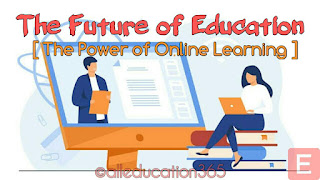The Future of Education: Harnessing the Power of Online Learning, AI, and Personalized Instruction
Harnessing the Power of Online Learning, AI, and Personalized Instruction
Education has always been a key aspect of human development, as it provides individuals with the knowledge, skills, and confidence to pursue their dreams and aspirations. However, the traditional methods of education have evolved and changed significantly over time, and the 21st century has seen the rise of new and innovative technologies that are transforming the way in which we learn.
The future of education is rapidly becoming increasingly centered around online learning, artificial intelligence (AI), and personalized instruction, and it is crucial that we understand how these technologies are shaping the future of education and how we can harness their power to create a better, more effective learning environment.
Online Learning
Online learning has become increasingly popular in recent years, and it is now a mainstream method of learning that is accessible to people all over the world. Online learning is a flexible and convenient way of gaining knowledge and skills, and it offers a range of benefits, including:
- Flexibility: Online learning allows students to study at their own pace, from the comfort of their own homes, and at times that are convenient for them. This is particularly beneficial for those who have busy schedules or who live in remote areas, as they can access learning materials and complete assessments from anywhere, at any time.
- Cost-effectiveness: Online learning is typically more cost-effective than traditional forms of education, as students do not have to pay for transportation, accommodation, or other associated costs. Additionally, many online courses are free or available at a lower cost than traditional courses, making education more accessible to people from all walks of life.
- Variety: Online learning platforms offer a vast range of courses and programs, covering a wide range of subjects and disciplines. This means that students can choose to study topics that are of interest to them, and they can easily switch between courses and programs to find the ones that best suit their needs and goals.
- Access to resources: Online learning platforms provide students with access to a wealth of resources, including course materials, videos, podcasts, and interactive simulations. These resources are often more engaging and interactive than traditional forms of education, making learning more enjoyable and effective.
Artificial Intelligence
Artificial Intelligence is becoming an increasingly important aspect of education, as it has the potential to revolutionize the way in which we learn. AI can be used to create personalized learning experiences, provide real-time feedback, and automate certain tasks, making education more effective and efficient. Some of the benefits of AI in education include:
- Personalized instruction: AI can be used to analyze student data and provide customized feedback and recommendations, helping students to focus on areas where they need the most help. This can also help to reduce frustration and improve motivation, as students feel that they are making progress and achieving their goals.
- Real-time feedback: AI can provide students with real-time feedback and suggestions, helping them to identify areas where they need to improve and to track their progress. This can help students to feel more engaged and motivated, and it can also help to reduce the workload of teachers and instructors.
- Automation: AI can automate certain tasks, such as grading assignments and providing feedback, freeing up teachers and instructors to focus on more important tasks, such as developing course content and providing individualized support.
Personalized Instruction
Personalized instruction is becoming increasingly important in education, as it helps students to feel more engaged and motivated, and it can also improve learning outcomes. Personalized instruction is a form of education that is tailored to the individual needs and goals of each student, and it can include elements such as:
- Adaptive learning: Adaptive learning is a method of personalized instruction that adjusts the learning experience in real-time based on student performance. This means that students receive individualized feedback and support, and the content and pace of the course is tailored to their needs and abilities.
- Collaborative learning: Collaborative learning is a method of personalized instruction that involves students working together in small groups to complete assignments and projects. This helps students to develop important social and communication skills, and it also allows them to learn from each other and to receive feedback and support from their peers.
- Project-based learning: Project-based learning is a method of personalized instruction that involves students working on real-world projects and problems. This helps students to apply their knowledge and skills in a practical and meaningful context, and it also helps them to develop important problem-solving and critical thinking skills.
Conclusion
The future of education is rapidly evolving, and the rise of online learning, AI, and personalized instruction is transforming the way in which we learn. By harnessing the power of these technologies, we can create a more effective, efficient, and enjoyable learning environment that better meets the needs and goals of students.
It is crucial that we continue to invest in and develop these technologies, as they have the potential to improve the quality of education for people all over the world.
